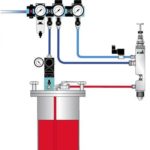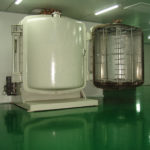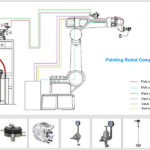Electrophoresis and powder coating are widely solutions used for metal surface treatment. Regardless the way of application, the consideration over the two options are more awared without a professional guidance. Following we collected the pros and cons of electrophoresis and powder coating and how to choose for specific purposes.
Electrophoresis: a commonly used industrial automation production process. During the electrophoresis process, metal objects are electrified and immersed in an electrophoresis tank. There is an electrolytic solid powder solution in the conductive liquid. When it moves from the anode on the metal to the cathode, the pigment moves from the anode of the metal to the cathode of the metal and combines with the cathode surface to form a shell. The products produced using electrophoresis technology have a smooth surface and are corrosion-resistant.
Powder coating: generally refers to electrostatic powder spraying, which is processed in a chamber with electrostatic field. During spraying, solid powder is electrostatically charged and is guided to a solid surface with an opposite charge or a grounded metal object through the action of the electric field. After spraying, the powder is melted by heating and combined with the surface of the object to form a solid shell. The thickness of the spray can be adjusted according to needs.
Pros & Cons of electrophoretic coating
Pros:
- Uniform coating: Electrophoretic coating can obtain a uniform paint film on workpieces with complex shapes, especially on the sharp edges, corners and gaps of the workpiece.
- Strong adhesion: The paint film of electrophoretic coating has strong adhesion and good corrosion resistance, which can significantly improve the anti-corrosion performance of the workpiece.
- Environmental protection: Electrophoretic coating adopts a closed circulation system, which results in less paint waste, simpler wastewater treatment, and higher environmental performance.
- High degree of automation: Electrophoretic coating is suitable for large-scale production, and can realize automated continuous production and improve production efficiency.
- High safety: Electrophoretic coating uses water as a carrier, has low solvent content, has low fire risk, and the coating can be recycled well and has little impact on the environment.
Cons:
- Complicated equipment: Electrophoretic coating equipment is complex, with high investment costs, high power consumption, strict construction conditions, and requires professional operation and management.
- High cost: The cost of electrophoretic coating is relatively high, and it is suitable for occasions with high quality requirements and large production scale.
- Fixed color: The color cannot be changed during electrophoretic coating, and the stability of the coating is difficult to control if it is stored for too long
Pros & Cons of powder coating
Pros:
- High coating efficiency: The film formation time is short, and the film formation can generally be completed within 2 minutes.
- Controllable thickness: The coating thickness of powder coating can be adjusted as needed, suitable for workpieces of different sizes.
- High flexibility: Powder coating is flexible and suitable for workpieces of various shapes and sizes.
Cons:
- Poor coating uniformity: Powder coating is prone to bubbles and uneven coating.
- Poor stability: Powder spray coating has poor stability and is not as good as electrophoretic coating.
- High curing temperature: Powder spray coating has a high curing temperature and has certain requirements for equipment and environment.
- Low permeability: Powder spray coating has a low permeability, and the coating effect of complex-shaped workpieces is not as good as electrophoretic coating.
The application scenario determines the coating process. Electrophoresis has good salt spray resistance but generally poor weather resistance and cannot be used as a topcoat. But electrophoresis is definitely the best choice for interior cavity corrosion protection
Generally speaking, electrophoretic coating is better than powder coating because it is not only safer, more environmentally friendly, and has a higher utilization rate than powder coating, but also has a fine, uniform, and smooth coating film. It has the best adaptability to products that require precision and can provide the most complete and comprehensive anti-corrosion protection for the coated workpiece. For outdoor products, electrophoresis nowadays is normally used as base coat and powder coating as top coat to acheive the best performance.




